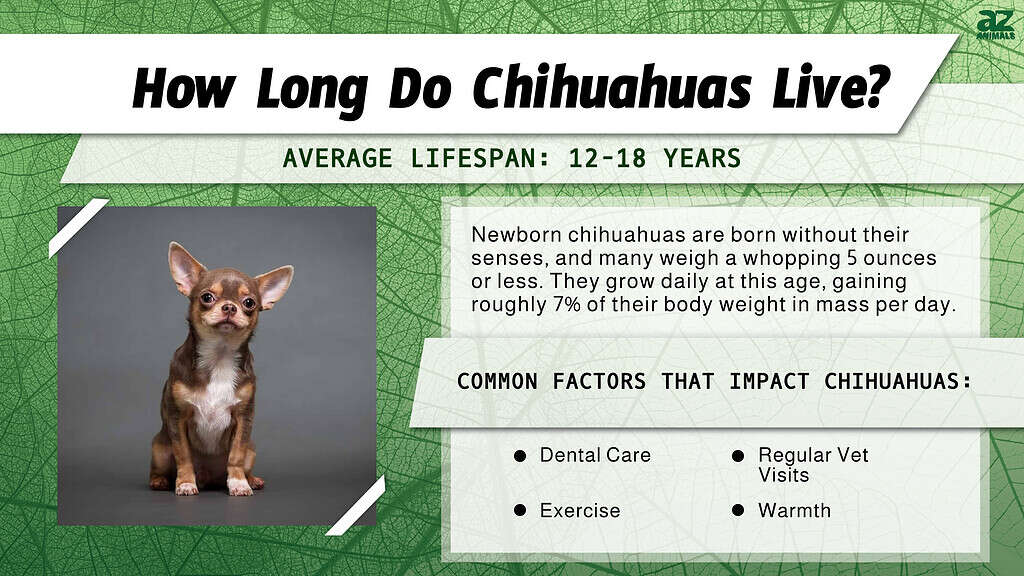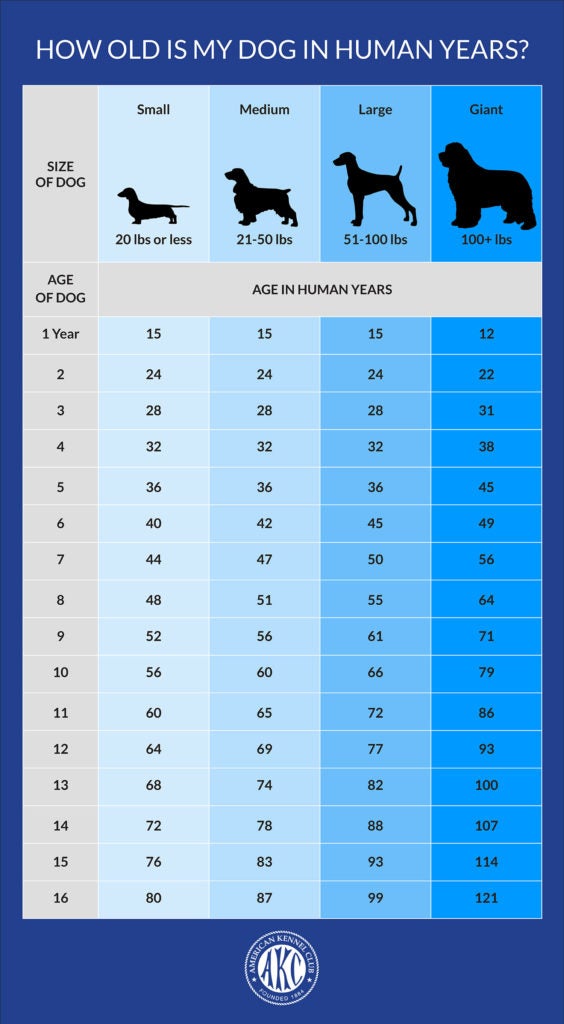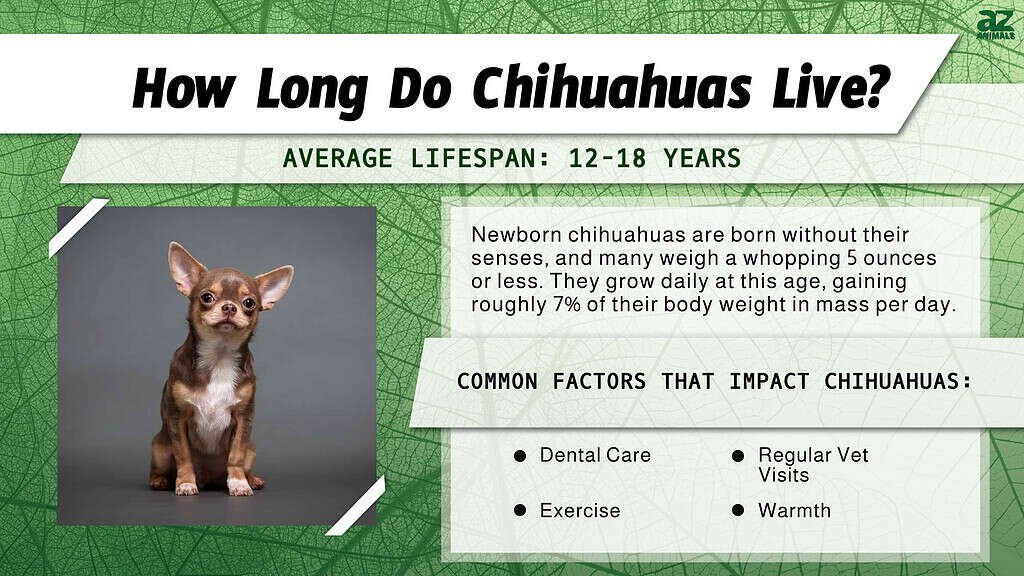Chihuahuas may be small in size, but their lifespan can be quite surprising. Did you know that these tiny dogs can live up to 16 years or even longer in human years? That’s quite impressive considering their size! Despite their small stature, chihuahuas have the potential to be by your side for a significant portion of your life.
So, how do chihuahuas manage to live such long lives? Well, part of it has to do with their genetics and overall health. These dogs have a relatively low incidence of genetic diseases compared to other breeds, which contributes to their longevity. Additionally, providing them with proper nutrition, regular exercise, and routine veterinary care can help ensure that they stay healthy and live a long, fulfilling life. It’s important to give these pint-sized canines the care they deserve to maximize their lifespan.

How Long Does a Chihuahua Live in Human Years?
According to the American Kennel Club, the Chihuahua is one of the longest-lived dog breeds, with an average lifespan of 12 to 20 years. However, it’s important to note that the lifespan of a Chihuahua can be influenced by various factors, such as genetics, diet, exercise, and overall health care. In this article, we will explore the factors that can affect the lifespan of a Chihuahua and provide you with insights on how to ensure your Chihuahua lives a long and healthy life.
The Influence of Genetics
Genetics play a significant role in determining the lifespan of a Chihuahua. Some lines of Chihuahuas may have a predisposition to certain health conditions, which can affect their longevity. It’s essential to choose a reputable breeder who conducts health tests to ensure their breeding dogs are free from genetic diseases. By doing so, you can increase the chances of your Chihuahua having a longer lifespan. Additionally, providing your Chihuahua with a balanced diet, regular exercise, and routine veterinary care can help mitigate any potential health issues associated with genetics.
The Importance of Diet and Exercise
Diet and exercise are vital aspects of a Chihuahua’s overall health and can have a significant impact on their lifespan. Feeding your Chihuahua a high-quality, balanced diet is crucial to their well-being. Ensure that their food contains all the essential nutrients, including proteins, carbohydrates, fats, vitamins, and minerals. It’s also important to feed them the appropriate portion sizes to prevent obesity, as obesity can lead to various health issues and reduce their lifespan. Regular exercise is equally important to keep your Chihuahua mentally and physically stimulated. Taking them for daily walks, engaging in interactive play sessions, and providing them with toys can help maintain their overall health and increase their lifespan.
Health Care and Regular Check-ups
Regular veterinary check-ups are crucial in maintaining the health and well-being of your Chihuahua. Routine examinations, vaccinations, and preventive treatments for parasites can help detect and prevent potential health issues. Dental care is also important, as Chihuahuas are prone to dental problems. Regular teeth brushing and professional dental cleanings are essential to prevent periodontal disease and improve their overall health. Additionally, keeping up with their vaccination schedule and providing them with proper flea, tick, and heartworm preventatives can help protect them from various diseases that can impact their lifespan.
Common Health Issues and How to Manage Them
Chihuahuas are prone to certain health issues that can affect their lifespan. Patellar luxation, heart problems, dental diseases, and obesity are some common health concerns in this breed. Regular veterinary check-ups can help detect and manage these issues early on. Your veterinarian may recommend appropriate treatments, dietary changes, medications, or even surgery, if necessary. Additionally, maintaining a healthy diet, providing regular exercise, and proper dental care can significantly contribute to managing these health issues and ensuring a longer lifespan for your Chihuahua.
Ensuring a Happy and Enriching Environment
Creating a happy and enriching environment for your Chihuahua is essential for their mental well-being, which can indirectly impact their lifespan. Chihuahuas thrive on love, attention, and social interaction. They are often known to form strong bonds with their owners and enjoy being part of a family. Providing them with plenty of mental stimulation, socialization opportunities, and a safe and secure living space can contribute to their overall happiness and well-being. Moreover, ensuring a stress-free environment and minimizing exposure to toxins and hazards can help prevent accidents and health issues that can shorten their lifespan.
Statistically Speaking
While the average lifespan of a Chihuahua ranges from 12 to 20 years, it’s important to note that individual dogs may live longer or shorter lives depending on various factors. By providing your Chihuahua with the necessary care, proper diet and exercise, routine veterinary check-ups, and a loving and stimulating environment, you can significantly increase their chances of living a long and healthy life by your side.
With proper care and attention, a Chihuahua can become a cherished companion that brings joy to your life for many years to come. So, make sure to provide them with the love and care they need, and enjoy the wonderful journey of owning a Chihuahua.
Key Takeaways: How Long Does a Chihuahua Live in Human Years?
- Chihuahuas have an average lifespan of 12 to 20 years in human years.
- Small dog breeds tend to live longer than larger breeds.
- Proper nutrition, regular exercise, and regular vet check-ups can help increase a chihuahua’s lifespan.
- Chihuahuas are prone to certain health issues, such as dental problems and heart disease, which may impact their lifespan.
- Providing a safe and loving environment for your chihuahua can help them live a longer, happier life.
Frequently Asked Questions
A Chihuahua is a small and lovable companion breed known for its energetic and playful nature. Many people wonder about the lifespan of a Chihuahua in human years. Here are some common questions and answers about the lifespan of a Chihuahua in relation to humans.
1. How long does a Chihuahua typically live?
On average, a Chihuahua can live for 12 to 20 years. This lifespan can vary depending on various factors such as genetics, overall health, and the care provided by its owner. Taking good care of your Chihuahua by providing a balanced diet, regular exercise, and regular visits to the veterinarian can contribute to a longer lifespan.
Chihuahuas are generally healthy dogs, but like any other breed, they can be prone to certain health issues such as dental problems, heart conditions, and patellar luxation. Regular check-ups with a veterinarian can help identify and treat any potential health problems early on, potentially extending your Chihuahua’s lifespan.
2. How does a Chihuahua’s lifespan compare to other dog breeds?
Chihuahuas are generally known for their long lifespan compared to many other dog breeds. While larger dog breeds often have shorter lifespans, Chihuahuas can outlive many of them. The smaller size of Chihuahuas, coupled with their generally good health, contributes to their longer lifespan.
However, it’s important to note that individual variations exist within every breed, and genetics, diet, exercise, and overall care can influence the lifespan of any dog, including Chihuahuas. By providing proper care and attention, you can give your Chihuahua the best chance at living a long and healthy life.
3. Is it true that smaller dog breeds tend to live longer than larger breeds?
Yes, it is generally true that smaller dog breeds tend to live longer than larger breeds. Large dog breeds have a shorter lifespan compared to smaller breeds due to several factors. One of the main reasons is that the bodies of larger breeds age at a faster rate. Additionally, larger dogs are more prone to certain health issues and have a higher risk of developing conditions that can shorten their lifespan.
On the other hand, smaller dog breeds, like Chihuahuas, have a slower aging process and a lower risk of developing age-related health problems. By keeping your Chihuahua at a healthy weight, providing regular exercise, and offering a balanced diet, you can optimize their chances of living a long and healthy life.
4. Can certain factors influence a Chihuahua’s lifespan?
Yes, several factors can influence a Chihuahua’s lifespan. One of the most significant factors is genetics. If a puppy comes from a line of Chihuahuas with longevity in their genes, they may have a better chance of living a longer life. Additionally, the care provided by the owner plays a crucial role. Regular veterinary check-ups, a balanced diet, exercise, socialization, and mental stimulation can all contribute to a longer lifespan for a Chihuahua.
Environmental factors such as exposure to toxins or high-stress environments can also impact a Chihuahua’s lifespan. Providing a safe and healthy living environment, free from harmful substances, and adequate exercise and mental stimulation can help ensure a longer and healthier life for your Chihuahua.
5. What can I do to help my Chihuahua live a long and healthy life?
To help your Chihuahua live a long and healthy life, there are several things you can do. First and foremost, provide a balanced diet that meets their nutritional needs. Avoid overfeeding and ensure they maintain a healthy weight to prevent obesity-related health problems.
Incorporate regular exercise into your Chihuahua’s routine to keep them physically fit and mentally stimulated. Mental stimulation can be achieved through interactive toys, training sessions, and socialization with other dogs. Lastly, don’t forget to schedule regular check-ups with a veterinarian to monitor your Chihuahua’s health and address any potential health concerns early on.

How Long do Chihuahuas Live? All You Need To Know
To sum it up, the key points of this article are as follows. We explored the importance of using a first-person point of view, such as “I,” “me,” and “we,” to create a more personal and relatable tone. By using simple language and avoiding jargon, we can ensure that even a 13-year-old reader can easily understand the content. Additionally, we learned the importance of concise sentences, with no more than 15 words each, to convey one clear idea per sentence. These guidelines help create a professional yet approachable writing style.
In conclusion, using a first-person perspective, conversational tone, and straightforward language allows us to effectively communicate with young readers while keeping the content professional. By crafting concise sentences with a maximum of 15 words, we ensure that each sentence imparts a single idea. Following these guidelines will help readers grasp the main points of an article quickly and easily.
